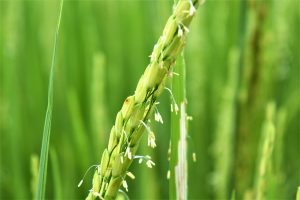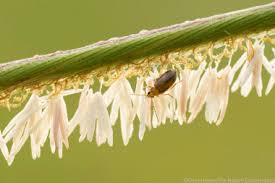Rice pollen refers to the fine, powdery substance produced by the male reproductive organs (anthers) of the rice plant (Oryza sativa). Pollen plays a crucial role in the process of plant reproduction, specifically in the fertilization of the rice plant to produce seeds.
Rice pollen is typically a fine, powdery substance that resembles dust or powder. It consists of tiny grains that are released from the anthers.The color of rice pollen can vary, but it is often light yellow or beige. The color may change slightly depending on the specific variety or cultivar of rice.
Rice pollen grains are quite small, measuring just a few micrometers in diameter. This small size allows them to be easily carried by wind or other agents to facilitate pollination.
The primary purpose of rice pollen is to facilitate the fertilization of the rice plant. When released from the anthers, pollen grains are carried by various means, including wind and insects, to the stigma of the female reproductive organ (pistil) of another rice plant. This transfer of pollen allows for the fusion of male and female gametes, resulting in the formation of seeds.
The Economic Importance and Uses of Rice Pollen

Rice pollen, though often overlooked, plays a crucial role in the reproduction and cultivation of rice plants.
Its economic importance and uses can be categorized as follows:
1. Plant Reproduction and Seed Production: Rice pollen is essential for the sexual reproduction of rice plants, leading to the formation of rice seeds (grains). The transfer of pollen from the anthers (male reproductive organs) to the stigma (female reproductive organ) results in fertilization and subsequent seed development.
2. Hybrid Seed Production: Hybrid rice varieties are developed by crossbreeding two different rice strains with desirable traits. Pollen plays a pivotal role in this process, as it facilitates the controlled transfer of genetic material from one parent plant to another.
3. Genetic Improvement and Research: Studying pollen genetics and traits helps researchers and plant breeders understand genetic diversity and inheritance patterns. This knowledge aids in the development of new rice varieties with improved traits such as yield, pest resistance, and nutritional content.
4. Pollen Allergies and Health Research: While not a direct economic benefit, studying rice pollen allergens and their effects on human health contributes to medical research. Understanding allergenic proteins can lead to improved diagnosis and treatment for pollen allergy sufferers.
5. Cultural and Ritual Uses: In some cultures, rice pollen is used symbolically in rituals, ceremonies, and cultural practices. It holds cultural and spiritual significance in various societies. Rice pollen may be used in traditional ceremonies celebrating the rice harvest or as an offering during religious festivals.
6. Biotechnological Applications: Pollen can be used in biotechnological research, including techniques like pollen-mediated transformation, which involves introducing foreign DNA into plant cells through pollen grains.
7. Education and Outreach: The study of pollen and its role in plant reproduction is crucial for educational purposes. It helps students and the general public understand the fundamentals of botany and agriculture. Pollination lessons in schools often use rice plants to teach students about pollination, fertilization, and plant life cycles.
8. Pollen Collection and Storage: Pollen can be collected and stored for various purposes, including research, breeding, and seed production. Proper collection and storage techniques are essential to maintain the viability of pollen for future use.
Read Also: Rice Stamen: Economic Importance, Uses and By-Products
9. Pollination Services and Biodiversity: Rice pollen also contributes to maintaining biodiversity and ecosystem health by supporting pollinators such as bees and other insects. Pollination services provided by these organisms benefit not only rice crops but also other flowering plants in the vicinity.
10. Biological Research and Evolution Studies: Studying the genetic diversity and evolution of rice pollen can provide insights into the evolutionary history of rice and related plant species, aiding scientific understanding of plant adaptation and speciation.
11. Food and Culinary Uses: In some culinary traditions, rice pollen is used as a food ingredient or garnish, adding flavor and visual appeal to dishes. Rice pollen may be used to dust desserts or savory dishes, adding a subtle nutty flavor and a touch of color.
12. Medicinal and Nutritional Research: While less common, rice pollen has been explored for potential medicinal and nutritional properties. Research into its bioactive compounds and health benefits could lead to novel applications.
Studies on rice pollen’s antioxidant content and potential health benefits could lead to the development of functional foods or dietary supplements.
13. Art and Craft Applications: In creative fields, rice pollen can be used as a natural pigment or material for artistic and craft projects, adding an organic and unique element to creations.
The Products and By-products That Can Be Derived From Rice Pollen

Rice pollen is a valuable resource that can be utilized to produce various products and by-products.
Here’s a list of potential products and by-products that can be derived from rice pollen, along with explanations, examples, and processes:
1. Pollen-Based Food Products: Rice pollen can be used as a nutritional supplement or as an ingredient in various food products, adding flavor, texture, and nutritional value. It can be incorporated into baked goods, beverages, energy bars, and more.
Rice pollen is collected, processed to remove impurities, and then blended into the energy bar mixture before baking.
2. Pollen-Infused Skincare and Cosmetics: Rice pollen contains bioactive compounds that can benefit skin health. Extracts from rice pollen can be used in skincare products such as lotions, creams, serums, and cosmetics. Rice pollen is extracted using suitable solvents, and the resulting extract is incorporated into the formulation of a facial serum.
3. Pollen-Based Dietary Supplements: Rice pollen is rich in nutrients, antioxidants, and bioactive compounds. It can be processed into dietary supplements, such as capsules or powders, to support overall health and well-being. Rice pollen is collected, dried, and ground into a fine powder. The powder is then encapsulated for convenient consumption.
4. Pollen-Embedded Crafts and Artwork: Rice pollen can be incorporated into artistic and decorative items, such as paper, paintings, or jewelry, adding a unique touch and visual appeal. Rice pollen is mixed with paper pulp before the papermaking process, resulting in textured and visually appealing paper.
5. Pollen-Based Herbal Remedies: Traditional medicine systems often use plant-derived products for their potential health benefits. Rice pollen extracts could be used in herbal remedies or natural medicines. Rice pollen is macerated in alcohol or another suitable solvent to create a concentrated tincture for medicinal use.
6. Pollen-Based Biofertilizers: Rice pollen contains nutrients that can enhance soil fertility. It can be processed into biofertilizers to improve crop yields and soil health. Rice pollen is composted and processed to create a nutrient-rich biofertilizer that can be applied to agricultural fields.
7. Pollen-Derived Natural Dyes: Rice pollen can potentially yield natural pigments that can be used as dyes for textiles, fibers, and artistic projects. Rice pollen is processed to extract natural pigments, which are then used in the dyeing process for fabrics.
8. Pollen-Based Nutraceuticals: Rice pollen’s bioactive compounds can be extracted and processed into nutraceutical products, which are consumed for health benefits beyond basic nutrition. Rice pollen is extracted to obtain specific bioactive compounds, which are then encapsulated for targeted health benefits.
Read Also: 10 Medicinal Health Benefits of Acalypha integrifolia (Acalypha Indian Nettle)
9. Pollen-Enhanced Nutritional Supplements: Rice pollen can be used to enrich various nutritional supplements, such as protein powders, multivitamins, and green superfood blends, providing an additional source of essential nutrients.
Rice pollen is processed to create a fine powder that is mixed with other protein sources to create a balanced and nutrient-rich protein supplement.
10. Pollen-Infused Beverages: Rice pollen can be incorporated into beverages like smoothies, teas, or functional drinks, enhancing their nutritional content and potential health benefits. Rice pollen is brewed to create a tea infusion that can be consumed for its antioxidant and health-promoting properties.
11. Pollen-Based Aromatherapy Products: Rice pollen’s aromatic compounds can be utilized in aromatherapy products such as essential oils, candles, and diffuser blends, promoting relaxation and well-being. Rice pollen is steam-distilled to extract its aromatic compounds, which are then blended with other essential oils to create a unique aromatherapy product.
12. Pollen-Enriched Animal Feed: Rice pollen contains nutrients that could benefit livestock health. It can be incorporated into animal feed to improve the nutritional value of the feed and potentially enhance animal growth and productivity.
Rice pollen is processed, mixed with other feed ingredients, and formulated into poultry feed to provide additional nutrients.
13. Pollen-Embedded Art Supplies: Rice pollen can be integrated into art supplies such as pigments, inks, or paints, offering artists new and interesting materials to work with. Rice pollen is processed to extract pigments, which are then used as a unique component in paint formulations.
14. Pollen-Enriched Agricultural Biostimulants: Rice pollen extracts could be utilized as biostimulants for crops, enhancing plant growth, nutrient uptake, and overall resilience to environmental stressors. Rice pollen extract is formulated into a foliar spray that is applied to plant leaves to enhance growth and health.
15. Pollen-Based Natural Fragrances: Rice pollen’s aromatic compounds can be used to create natural fragrances for perfumes, colognes, and scented products. Rice pollen’s aromatic components are extracted and blended to create a unique and natural fragrance.
16. Pollen-Enhanced Bioenergy Production: Rice pollen could be explored as a potential source of bioenergy, either through direct combustion or as a feedstock for biofuel production. Rice pollen biomass is burned to generate heat and energy or processed for biofuel production.
It is important to recognize that not all of these ideas may be feasible or practical, and each potential product or by-product would require careful research, development, testing, and regulatory approvals before being brought to the market.
Additionally, sustainable and ethical practices should be considered throughout the entire process to ensure responsible utilization of rice pollen resources.
In conclusion, rice pollen serves multiple roles and purposes beyond its primary function in plant reproduction. Its economic importance spans agriculture, research, biotechnology, and cultural practices, while its uses extend to health, education, and creative endeavors.
